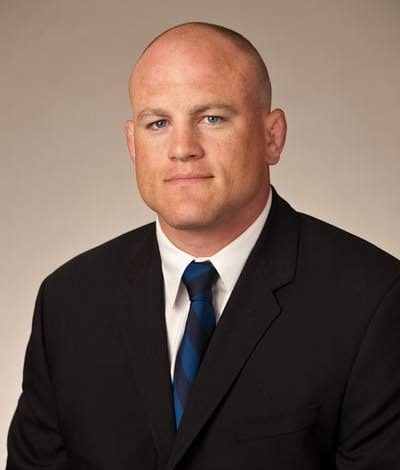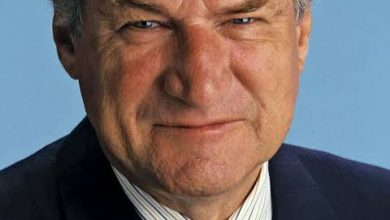Cael Sanderson Announces Devastating Health News: The End of an Era for Wrestling—The Shocking Truth Behind His Departure……………

Cael Sanderson Announces Devastating Health News: The End of an Era for Wrestling—The Shocking Truth Behind His Departure……………
In a heart-wrenching announcement that has left the world of wrestling in stunned disbelief, Cael Sanderson, the legendary head coach of Penn State’s wrestling team and one of the most iconic figures in the history of the sport, has revealed that he is stepping down from his coaching duties. This decision, made after months of grappling with severe health struggles, marks the end of an era for the Penn State wrestling program and will have far-reaching consequences for the future of collegiate wrestling.
This is not just another story of an athlete or coach stepping away—this is the departure of a titan. The ramifications of Cael Sanderson’s exit from the sport he has dominated for over a decade will resonate for years to come. Sanderson’s impact on Penn State, on collegiate wrestling, and on the lives of the countless athletes he mentored cannot be overstated. But now, faced with a battle for his own health, he has made the heartbreaking decision to step away.
The Shocking Announcement: A Legend’s Farewell
Cael Sanderson’s announcement came in the form of a poignant statement posted across social media and via the official Penn State athletics channels. With his characteristic humility, Sanderson revealed that he had been dealing with significant, debilitating health issues that had gradually intensified, leaving him physically and emotionally drained. After consulting with his family and doctors, Sanderson acknowledged that he could no longer serve the program or his athletes to the level of excellence he demands of himself.
“I have always believed in giving everything I have for my athletes, for the program, and for the sport of wrestling. But my health is no longer allowing me to do that. After much reflection, discussions with my doctors, and my family, I’ve come to the painful conclusion that it is time for me to step back and focus on my health. The demands of coaching at this level have become insurmountable for me at this time,” Sanderson shared in his emotional statement.
The news is gut-wrenching. For those who have followed Sanderson’s career, it’s hard to imagine the world of college wrestling without his presence. Cael Sanderson is not just a coach—he is the standard by which all coaches are measured. His tenure at Penn State, which began in 2009, turned the Nittany Lions into an unstoppable force, claiming nine NCAA team titles and turning the program into one of the most decorated in history. His athletes, many of whom have gone on to become legends in their own right, owe much of their success to Sanderson’s leadership, discipline, and passion.
A Battle with Health That We Never Saw Coming
Behind Sanderson’s iron-willed persona and near-perfect public image lay a private battle with health issues that had been intensifying over the last several months. The world of elite coaching is a grueling, high-stress environment, and for Sanderson, the physical and mental toll was simply too much. According to sources close to the coach, Sanderson had been dealing with chronic pain from previous injuries sustained during his career as a world-class wrestler, but those issues were exacerbated by ongoing neurological complications and severe fatigue.
While he had tried to power through, his body ultimately gave out, making it impossible for him to continue at the level of excellence required by one of the nation’s top wrestling programs. The rigorous demands of leading a championship-caliber team year after year, combined with the physical strain of the job, have taken their toll.
“Cael has always been a fighter, and for him to admit that he needed to step back was one of the toughest things he has ever done,” said a close friend of Sanderson, speaking on the condition of anonymity. “His health deteriorated to the point where he could no longer push through it. It wasn’t just pain—it was a combination of factors that made it impossible for him to continue coaching the way he always has.”
Sanderson, known for his stoic and determined nature, has been grappling with the pain of stepping away from something that has been his life’s work. To the wrestling community, his decision represents more than just a coach leaving his post—it’s a painful acknowledgment of the very human realities that athletes, no matter how legendary, must face.
The End of an Unprecedented Run
Cael Sanderson’s resume is one of the most extraordinary in the history of wrestling. As a competitor, he was unbeatable—literally. Sanderson’s career as an athlete is a benchmark that will likely never be matched. His perfect record of 159-0 at Iowa State, including four NCAA championships and an Olympic gold medal, made him a legend in the sport.
As a coach, Sanderson’s accomplishments were no less remarkable. Penn State became the most dominant program in NCAA wrestling under his leadership, winning nine NCAA team titles in just over a decade. His athletes didn’t just win—they dominated. Sanderson’s coaching philosophy is credited with transforming not only the athletes he coached but also the very culture of collegiate wrestling. His focus on developing both physical skill and mental fortitude created a team that was consistently the best in the nation.
Under his guidance, athletes like David Taylor, Zain Retherford, and Jason Nolf became household names in wrestling, each earning multiple NCAA titles and leaving their own mark on the sport. Sanderson’s influence extended far beyond victories and championships; it was his ability to instill confidence, discipline, and a sense of family within the team that made his program so successful.
But now, despite his unrelenting drive and unmatched achievements, Sanderson has had to face the one thing even his incredible willpower couldn’t overcome: his own body’s limits. It’s a harsh reality, but one that will reshape the course of collegiate wrestling.
The Legacy That Will Never Fade
Cael Sanderson’s legacy, however, is not bound to the mat or to the walls of a wrestling room. His influence will continue to ripple through the sport for years to come. Sanderson has left an indelible mark on his athletes, on his peers, and on the sport itself. His leadership has elevated the sport of wrestling, and his impact goes far beyond the titles and accolades.
The wrestling community is united in gratitude for everything Sanderson has done, but they are also heartbroken that his health has taken precedence over his career. Many of his former athletes and assistant coaches have expressed their support for his decision, acknowledging that it was the right choice for both his personal well-being and for the future of the program.
“Cael has done everything we could have ever asked of him, and more. It’s heartbreaking, but we support him 100 percent,” said Penn State wrestler and former national champion, David Taylor. “His legacy as a coach is unparalleled. No one has done more for wrestling than he has.”
What’s Next for Cael Sanderson?
While it’s unclear whether Sanderson will ever return to coaching, he has expressed that his immediate focus is on regaining his health and spending time with his family. His doctors are optimistic that with the right treatment and rest, he will be able to recover, though the road ahead is uncertain.
Despite his departure, Sanderson’s legacy will continue to inspire future generations of wrestlers and coaches. His philosophy, his work ethic, and his commitment to excellence will remain pillars of the sport, influencing the next wave of champions. Penn State’s wrestling program will carry forward the principles he instilled, and his athletes will honor his legacy by continuing to strive for greatness.
Cael Sanderson may be stepping away from the mat, but his influence will forever shape the future of collegiate wrestling. For those who have witnessed his greatness, the end of this era is both devastating and transformative—a reminder that even the greatest warriors must sometimes step back and fight for themselves.





